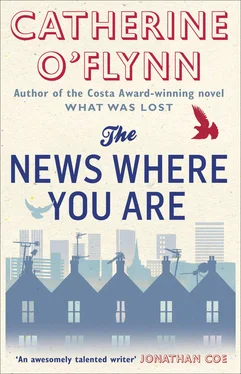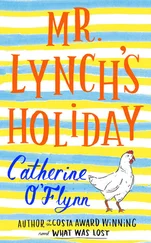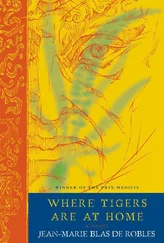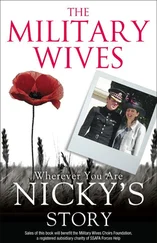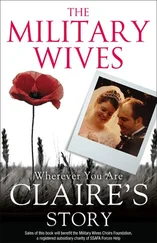‘What?’
‘The accident. The hit and run. I always assumed it was on some winding lane, but it’s not. It’s long and straight. If Phil was killed at the spot I saw today, I don’t know how the driver didn’t see him.’
‘Maybe they did see him, but they just lost control of the vehicle. Or maybe they fell asleep at the wheel.’
‘But then they’d have crashed as well. It just seems mad that they could drive down a perfectly straight road, kill a pedestrian who would be completely visible and then drive on.’
Andrea went back to her cooking. ‘Poor Phil. Of course he would be jogging. Couldn’t just age gracefully. Seventy-eight years old and still trying to look forty-five. Why couldn’t he just let himself go to seed? I can’t wait to start sprouting biscuit crumbs and money-off vouchers cut from My Weekly .’
Frank smiled and turned on the worktop TV. He stared at the screen, but found that all he saw were fluttering images of Phil’s face glimpsed on a tree on a long straight road.
He sat in his parked car and looked across at the banner declaring the grand opening. It described it as an exciting new leisure development. What that amounted to was a casino with a gym on top. Black and silver balloons bobbed frantically in the sharp wind. A few women with straightened blonde hair and suntans were dressed as bunny girls to lend glamour to the occasion. They clustered shivering in the shelter of the entrance. Stretched behind them he saw the pink ribbon that he would soon cut. The letter ‘o’ in the neon sign above the casino door was a roulette wheel. Above the glare of the sign, discreetly carved into the stone portico, were the words: Royal Children’s Hospital.
The Regal Casino was the latest and perhaps most audacious in a series of reimaginings of city landmarks. Birmingham was trying to change its reputation for the way it treated its architectural heritage: the famous lack of sentimentality that bordered on self-harm. The city now adopted a more sensitive approach to its Victorian heritage. Those notable examples that had managed to survive the post-war purges were protected and cherished.
One of the consequences of the current doctrine was a drive to find new uses for Victorian buildings. Many had stood empty for years, their original remit expired, obsolete or transferred to newer facilities. Now private development companies with names like Urban Heritage, Regeneris and New Concept were finding new ways to use old spaces.
Frank looked at the small crowd now assembling over the road. He always donated his PA fees to charity and that made him feel guilty for rejecting lucrative offers. He’d agreed to open the casino as a favour to an old colleague of his father’s whose son now owned Regeneris, but he couldn’t suppress his distaste for the development. He’d felt ambivalent in the past about some of the strange reinventions of old buildings. The eye hospital that became a luxury hotel, the imposing hilltop edifice of the Victorian mental hospital turned into apartments. He could never pass the grand driveway to the gated condominiums without remembering walking past as a boy and seeing the patients standing behind the chain-link fence shouting strange words and asking for fags. He wondered who would choose to live in a place of former suffering. What level of hubris was required to feel so utterly undaunted by the past?
Of them all, though, he found something particularly hard to take about the metamorphosis of a children’s hospital into a casino. It seemed to aspire to a new level of inappropriateness. The hospital had moved to larger premises five years earlier, but Frank always thought of it in its former home. He’d been there as a child to have his appendix out, and again as a panic-stricken father when Mo had fallen downstairs as a toddler. He’d also covered many stories there. In particular he remembered Lucy Smallwood, a ten-year-old with leukaemia who had spent her time in hospital engaged in one sponsored event after another, raising funds for other sick children. There was regular coverage of her attempts on the programme and in the local press and Frank would always remember the silence in the newsroom on the day she died.
He gazed at the images of dice and chips hanging in the windows and wondered who could feel lucky in such a place. Looking at his watch he saw there were still another ten minutes to go. He spent much of his life killing small blocks of time. It was a consequence of his punctuality. He wasn’t sure that punctuality was the right way to describe it: he was always early, which was, he supposed, as unpunctual as always being late, but he inconvenienced only himself and not others.
He’d been brought up to arrive fifteen minutes ahead of any appointment, but people didn’t want personalities to arrive early; they expected to be kept waiting. Now, after twenty years, he was able to recognize the unease that the public experienced when they saw celebrities — even of his minor variety — out of certain clearly defined realms. They understood that celebrities existed primarily in the spotlight — shuffling papers officiously as the intro music faded out, emerging from behind curtains, smiling on a sofa behind a pile of unread magazines. They understood also that celebrities had a ‘real life’. But this was a certain type of real life glimpsed only in photos in magazines with short one-word titles. Celebrities with no make-up on, with strange scars visible and shameful rolls of fat falling over expensive bikini bottoms. It was understood that celebrities existed in these separate and clearly defined realms, but the PA — the charity dinner, the restaurant opening — blurred these lines. The exotic and the mundane came together for a short while and it was essential that the celebrity balanced perfectly on the fine line between the two.
Frank used to arrive whilst the photographers were still setting up, quite happy to wait a few moments and exchange pleasantries with the staff of the shop or restaurant he was opening. He’d be there in his role as celebrity, but not quite ‘on’ yet. Eventually it was a restaurant manager who spelled it out to him. Frank had arrived ten minutes early and the manager whisked him off to the staff changing area to wait. ‘They don’t want to see you like that,’ he’d said, and for a moment Frank thought he’d spilled something down his suit, but then he realized what he meant. He had to emerge, fully formed and glistening, at the appointed hour, not hover awkwardly for ten minutes beforehand.
And so Frank had become practised at a form of invisibility. He had no control over his early arrival — it wasn’t something, at his time of life, that he had any power to change — but he did seem able to manage his visibility, to choose to be seen or unseen. He’d kill time in nearby shops, or read a newspaper in his car, and no one would notice him until he switched on his beam and stepped up to the ribbon. He remembered when he was a boy that he had written a list of superpowers on a piece of paper ranked in order of how much he craved them. He could only think of a few now, the obvious things: the ability to fly and to travel through time. He recalled clearly, though, that top of the list had been the gift of invisibility. Sometimes at night he’d pretend that he was wearing magic invisible pyjamas. He’d lie alone in his bed and be sure that no one could see him. He’d will his mother or father to come in the room and panic at his apparent absence, just so he could have proof of his invisibility. He’d lie and wait and the longer he waited the more he wondered if he really was invisible. He would start to worry about how he could know he was visible, that he even existed, if there was no one to see him. He’d fall asleep in a state of confusion unsure about himself, his imagination and his pyjamas.
Читать дальше
